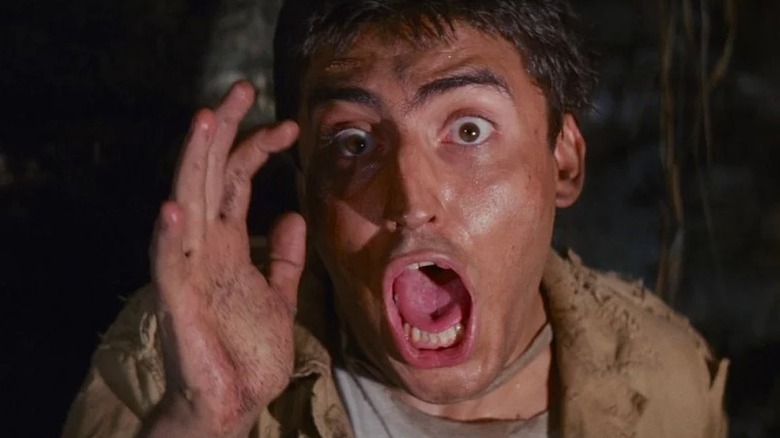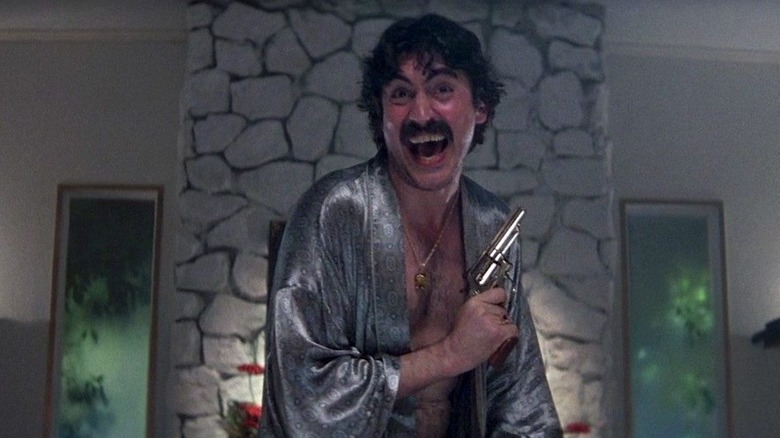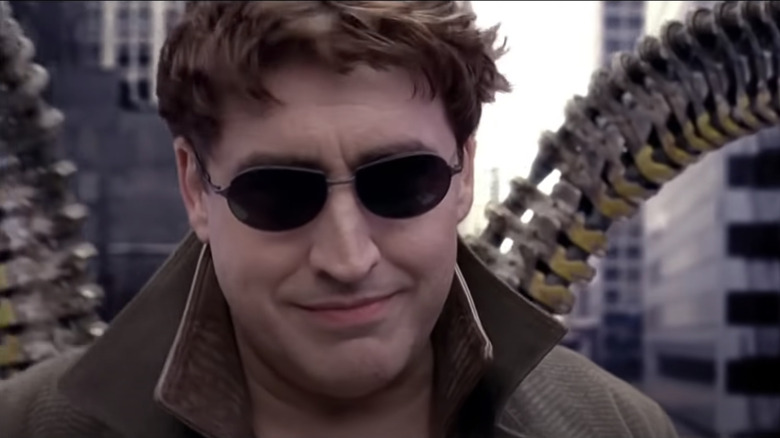Alfred Molina Saw Hollywood As An Escape From England's Typecasting
Many actors aspire to be chameleons, but for Alfred Molina, it comes naturally. Just watch him rehearse for "Fiddler on the Roof" on the set of "Spider-Man 2" (in costume as Doc Ock no less). Whether he's menacing Spider-Man with mechanical arms or busting a move to "Jessie's Girl," Molina's always a joy to watch.
However, the actor feels he was constrained early on in his career. Why? He wasn't English enough. He once joked he could never be cast in a Merchant Ivory film (producers of "Remains of the Day" and "A Room With A View"), explaining to the Irish Times:
"I think what I meant by that was that it would be unlikely that I would be cast and if I was I would be the swarthy foreign guy who tries to make a pass at Helena Bonham Carter, or the carriage driver who makes an impertinent remark to Dame Maggie Smith. I wouldn't be playing any of the English characters."
This is one reason why Molina left England and came to Hollywood, where he's enjoyed a prosperous, varied career befitting a character actor of his skillset.
A cosmopolitan childhood
"Alfred Molina" is a bit of a stage name. He was actually born with the much more Hispanic name "Alfredo" — remarkable how one letter changes a name's cultural connotations.
Molina is an Englishman by birth, but his father Esteban was Spanish and his mother Giovanna was Italian. As a first-generation immigrant from two different countries, Molina was still something of an outsider. He explained to the Irish Times:
"I was born and raised in Notting Hill when it was still a working class area — before Julia Roberts moved in. When I was at school the kids were Irish, West Indian, a lot of Portuguese and Italian. Almost all the kids were first generation and I heard this wonderful panoply of accents. So I guess I sucked it all up and turned it into this energy that drives what I do."
Indeed, Molina has played characters who hail from widely different cultures and ethnicities. His film debut was a Peruvian character: the two-faced Satipo in "Raiders of the Lost Ark." While he was working in England, he appeared in 1985's "Letter to Brezhnev," as a Russian immigrant from Liverpool named Sergei; while the character's ancestry was different from his own, the environment the film depicts is similar to Molina's own working-class childhood. In based-on-a-true-story "Not Without My Daughter," he played the Iranian professor Sayyed Bozorg Mahmoody, the abusive husband of the film's lead Betty (Sally Field). In Hollywood, he finally got the chance to play a Spaniard in "The Da Vinci Code," as Bishop Manuel Aringarosa. Molina explained that "In England, I was always the foreign guy. In America, I am just one kind of many ethnic types that are all working in film."
Caricature or character?
Things have changed since Molina was coming up as a performer. For one, there's now greater awareness and sensitivity around casting actors in their real ethnicities. This can make Molina playing so many different "foreign" parts uncomfortable. We've discussed his varied parts before; what makes them memorable is that he's never gone the easy route of caricature.
Take his two collaborations with Paul Thomas Anderson, "Boogie Nights" and "Magnolia." In each of them, he has a one-scene appearance as a vaguely Middle-Eastern character (his "Boogie Nights" character, Rahad Jackson, was reportedly based on Palestinian gangster Eddie Nash/Adel Gharib Nasrallah). Molina, never one to waste a scene, gives both characters such personality that you want to see more.
Solomon Solomon in "Magnolia" could be a checklist of stereotypes (immigrant small businessman, tight-fisted boss), but Molina gives him humanity. His scene is him berating his employee Donnie Smith (William H. Macy) and letting him go. As the scene goes on, even as Molina's tone never changes, it becomes clear Solomon's not speaking with needless anger; it's exasperation. He's heard Donnie's excuses one too many times and even if he doesn't hate him, he can't justify keeping him on.
Molina gives this same sort of humanity to Otto Octavius. His early, pre-Doc Ock scenes in "Spider-Man," where he gives Peter some love-life advice or drops some dad jokes ("Has anybody lost a large roll of 20 dollar bills in a rubber band? Because we found the rubber band."), he's both fun and foundation-building. Once Otto does become a villain, he's still just a man with tunnel vision to see his dream realized.
Ethnic stereotypes and supervillains are some of the most cardboard characters there are. But in the hands of an actor like Molina, they can be more.


